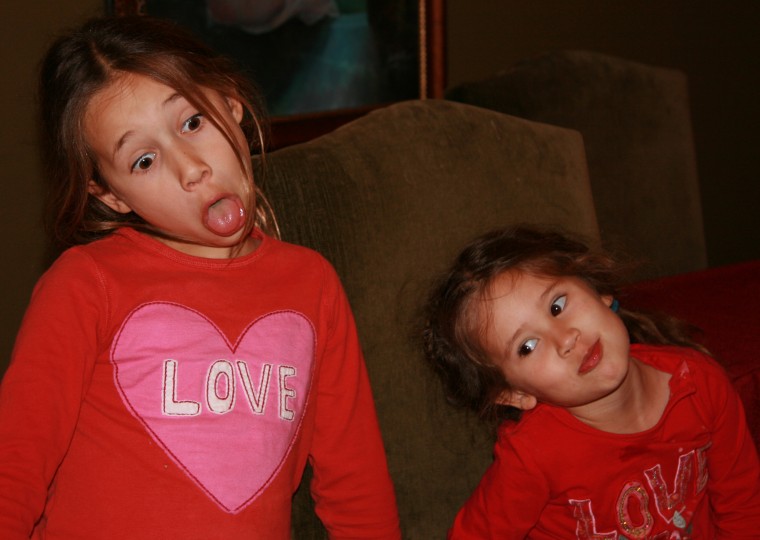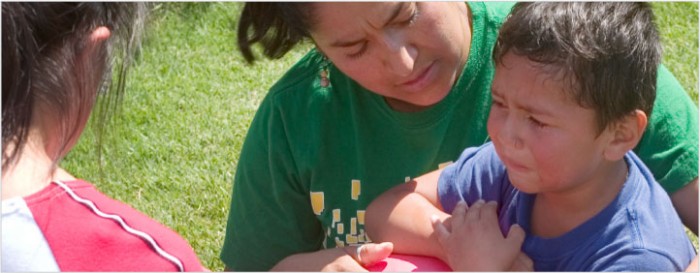When we decide to bring a second child home, we long for those siblings to be good friends. Or we at least hope to avoid siblings fighting all the time so we can get some quiet moments to ourselves. But inevitable tiffs, clashes, and explosions interrupt that dream we had for our children to play well together. We try to set limits meant to help our children stay out of one another’s way, but often, we get there too late! The damage happened before we knew there was trouble. It hurts all around.
 These are moments when our example—our tone, our words, our demeanor—speaks far more eloquently than any words we can say or demands we might attempt to make. If we can show caring at difficult moments, they’ll be able to muster up more caring at difficult moments, perhaps not today, but some day. Our every move, our every glance, our true intent all registers fully with our children when feelings run high.
These are moments when our example—our tone, our words, our demeanor—speaks far more eloquently than any words we can say or demands we might attempt to make. If we can show caring at difficult moments, they’ll be able to muster up more caring at difficult moments, perhaps not today, but some day. Our every move, our every glance, our true intent all registers fully with our children when feelings run high.
5 things you can do when intervening in a moment of sibling rivalry:
1. Make things safe as soon as you see siblings fighting.
Don’t tell them to stop. Make “Stop” Happen. Reach in and move them a foot away from one another. Or put your hand on the item that’s being fought over, so they can have their feelings while you hold it firm between them. You don’t need to take anything away, unless it’s a knife or a cudgel. You don’t need to be rough. Just make things safe, much like a referee in a basketball game when tempers flare. Move your children a bit of a distance from one another. You can’t make their big feelings go away right this minute, so simply pay attention. They’ll cry, tantrum, and shed those prickly feelings. You’ll hear all about it. No need to ask questions. Listen. The story will come out. And it will take awhile. Settle in, and offer your attention.
 2. No blame, no shame.
2. No blame, no shame.
It happened. It no longer matters who started what—whatever occurred is now history. What matters now is healing. Blaming someone won’t help the person who is blamed to learn. Shaming them won’t prevent another incident. What will work is caring, attention, and efforts to connect with the child who was thoughtless. To make it clear that we care, we parents can assume the responsibility on ourselves. “I’m so sorry I didn’t get here in time to help you both.” “I wish I had known that things were getting hard for you.” “I’m so sorry this happened. I know it’s not easy for either of you.”
3. Trust your children’s goodness.
Count on it. However things look on the surface, your children care about each other. They want to be close and relaxed with one another. They long to play and cooperate well. Calling on that trust helps both the victim and the aggressor in the situation. “Your sister loves you. I’m sorry she hit you. She must have been feeling pretty bad inside to do that.” “You have a good brother. I’m sorry he put paint on your teddy bear. I don’t think he feels good about it.”
4. Take the time to listen.
Don’t fix a thing until tantrums are fully heard, and tears are fully shed. Unless your child is hurt and needs medical attention, take the time to Staylisten, so the damage one child did can be healed in the child who felt the insult, or suffered the injury. When you are present, listening heals the hurt. You can help the child who was hurt to heal thoroughly, so they aren't tempted to hurt in return.
If you listen, your child will cry, tantrum, or fight and struggle mightily as they offload fear. When they are finished, they will have healed from this incident, and will have gained some confidence in the process. They will be better able to defend themselves, and better able to come to you for help, instead of freezing in place if their sibling becomes threatening again. So listen. It’s so much more effective than any “fix” you could impose.
5. Reconnect with the child who was the aggressor.
Children don’t want to hurt others. But they do get disconnected and scared, and at those times, behaviors leap out of them that they don’t have much control over. After they’ve hurt someone, they feel no love, no caring. Guilt erases all outward evidence of the tender heart that beats inside them. Don’t let this distant attitude fool you. Your child aches because of what just happened, and needs a warm connection with you more than ever.
Offer some Special Time to reconnect. The hurt feelings that bothered your child enough to make trouble will surface soon. They will have an upset because of what you serve for dinner, or because toothpaste has smudged their pajamas. Move in. Listen. This is your chance to get to the bottom of the trouble that happened earlier. You’ve got a child who wants to feel you there, close and caring. Staylistening will open those doors to connection once again.
When you bring caring, the faith that your children are good children, and your willingness to listen, you become a powerful healing force in your family. You lead by example. You call forth the very best in your children, by being there for them, and compassionate toward all of them, through the worst of times.
Here’s how it can work:
My 6-year-old son, 4-1/2-year-old daughter and I had stopped at a local establishment for lunch. My son got out of the car and closed the door, not noticing that his younger sister was also on the way out his door. She wasn’t injured physically but was hurt by the insult of having the door slammed on her. She began to cry and cry, and at first my son wanted to cast the blame on her and tell her that she shouldn’t have come out his door.
I stopped him by saying, “She’s really upset. Let’s just listen to her have her feelings about what happened right now.” I put an arm around her and he came close and we both just gave her our attention while she cried. When she finished my son apologized to her instead of offering the lecture he initially wanted to offer. I think the listening to her cry helped him too!
She readily accepted his apology, which she won’t typically do when she’s hurting. They walked arm and arm into the restaurant while my son gently reminded his little sister that she should let him know when she’s coming out his door so that won’t happen again. For me, this is an especially powerful example of how listening to someone who is hurt makes way for clearer thinking, compassion, understanding, and love on both parts. I wish my children got along that beautifully all of the time but I’ll take these moments when I can get them!
—a mother in Maine, USA
Looking for more help with Sibling Rivalry? Patty created a self-guided video course Taming Sibling Rivalry to help you build the skills and understanding you need to truly mend your children’s relationships with one another.

